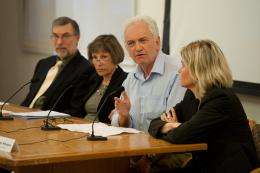The humanities in America -- an endangered species?

(PhysOrg.com) -- In a world that is becoming more fast-paced and technological, the humanities are under fire to defend their time-honored centrality in Western culture and education. In the world of iPhone apps and the Tweet, is there a role for the slow-cooked thoughts of the humanities?
Is there still room for literature, history, philosophy and art?
Geoffrey Harpham, president and director of the National Humanities Center and author of The Humanities and the Dream of America, argued in a recent appearance at Stanford that American notions of humanities are uniquely linked with nationhood – in fact, he went so far as to argue that the humanities were "made in America," circa 1945.
In other nations, humanities were "never conceived as a democratic program. The genius of this country is a program of education for all its citizens. It's not an expansion of scale, it's a completely different understanding."
Harpham pointed to the rhetoric in influential postwar reports and policy recommendations. One 1964 report even claimed that "the humanities are not merely our, but the world's, best hope," and concluded that "world leadership of the kind which has come upon the United States cannot rest solely upon superior force, vast wealth or preponderant technology. Only the elevation of its goals and the excellence of its conduct entitle one nation to ask another to follow its lead. These are things of the spirit."
What Harpham described as "the shotgun marriage of national defense and things of the spirit" was destined for a comedown in a more cynical era.
The rationale for the humanities "slipped into incoherence in the mid-1960s," he said. American notions of patriotism, duty, sacrifice and a common destiny gave way to "the American daydream of personal gratification" and the "meretricious fantasy of consumption."
Humanities may be in even more trouble in Britain, "land of Shakespeare and Austen and Masterpiece Theatre," as Harpham put it. England is facing severe cutbacks in humanities, with recommendations for 100 percent cuts in state funding.
He said such extreme measures "are still inconceivable here, despite inroads."
If the humanities relinquish their claims to wisdom, they might "also sacrifice the questing or exploratory aspect that makes us care about them," he said.
Russell Berman, a professor in the humanities and director of the Introduction to the Humanities program for Stanford's incoming freshmen, decried the "research narcissisms" and "follow your passion" ethos that have driven the humanities away from their central charge. "Our dignity is in the classroom, pursuing that mission of edification," he said.
Philosopher Debra Satz, Stanford's senior associate dean for the humanities, praised the humanities' role not only in "cultivating critical imagination, sympathetic understanding," but in drawing together people from diverse backgrounds working toward common concerns.
History Professor Caroline Winterer challenged Harpham's World War II genesis for the creation of the humanities in the United States. She agreed that the humanities were born in a moment of crisis, "but it was essentially the crisis of the Industrial Revolution."
On one point, the two seemed to concur: The humanities flourish in crisis.
"Lucky for us, there seems to be no end of crises in sight," Harpham said.
Provided by Stanford University
















